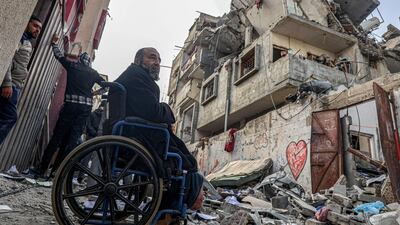Live updates: Follow the latest news on Israel-Gaza
Signs are growing that a truce in the Gaza war may be around the corner, with the US determined to pause the nearly five-month conflict before Ramadan and Hamas appearing to soften some of its conditions.
US President Joe Biden, whose country is Israel’s main backer, said late on Monday that Prime Minister Benjamin Netanyahu's government had agreed not to engage in military activities in the Palestinian enclave during Ramadan, which is expected to begin on March 10.
This will “give us time to get all the hostages out”, Mr Biden said in an appearance on NBC's Late Night With Seth Meyers.
“My hope is by next Monday we'll have a ceasefire … We're close, we're not done yet”.
The news of a possible truce comes at a time when mediators from the US, Egypt and Qatar are engaging in the biggest diplomatic push in weeks for a cessation of hostilities and a swap of poisoners and hostages.
Mediators are meeting this week in Qatar to work out the details and mechanisms to enact draft proposals they hammered out in Paris last week.
The negotiations are expected to move to Cairo late this week or early next week, according to sources.
Under discussion is the naming of a non-partisan Palestinian government made up of technocrats to run both Gaza and the occupied West Bank when the fighting stops.
The proposed administration is expected to remain in place until legislative and presidential elections are held.

A truce might become possible if Hamas is able to negotiate some of the conditions it has remained firm on, yielding to pressure by Egypt and Qatar, as well as the tragically high death toll among civilians – about 30,000 since the war began in October – and an unprecedented level of destruction across the densely populated territory.
Mr Netanyahu, on the other hand, faces the risk of inflicting lasting damage on his country’s strategic relations with the US if he does not respond favourably to Washington’s growing calls for the war to stop, albeit temporarily, to allow for the hostages to be freed and much-needed humanitarian aid to reach Gaza.
“The United States’ mind is made up that this war must end and that’s exactly what will make it stop,” said one of the sources.
Mr Netanyahu’s government is also under mounting pressure from the families of the hostages to strike a deal for their release, but he has publicly said that he would not do that at any price.
Egypt’s keen interest in pushing for an end to the war is to head off an influx of Palestinians into its Sinai Peninsula if Israel invades Rafah on its eastern border.
Cairo also hopes that a halt to the fighting will persuade Yemen's Iran-backed Houthi forces to stop their attacks on Red Sea shipping, which have badly hurt its vital revenue from the Suez Canal at a time of deep economic struggle.
The war has similarly hurt Egypt’s revenue from another key source, tourism.

The Gaza war was triggered by Hamas's surprise attack on Israel on October 7 in which 1,200 people were killed and 240 taken hostage by the militant group.
Israel’s response was a devastating military campaign in Gaza that displaced about 85 per cent of the enclave’s population and razed much of its built-up areas.
The conflict also left about 1.5 million Palestinians crammed in makeshift camps in Rafah on the Egyptian border, where they face hunger and spreading diseases.
The proposals drafted by the US, Egyptian and Qatari mediators in Paris envision a six-week pause in the war and a hostage and prisoner swap between Hamas and Israel, according to the sources.
If adopted, the swap would begin with the release of 40 to 50 children, women, ailing and elderly hostages, by Hamas in return for about 300 Palestinians held in Israeli prisons, sources said.
Hamas, said the sources, would hold on to active military service members, with their phased release hinging on progress in reaching a permanent ceasefire.
The Palestinian group freed about 100 hostages during a week-long truce in late November. About 130 are believed to remain, of whom as many as 30 may have died in captivity.
In return for the active members of the Israeli military, who are thought to include five female soldiers and several male officers, Hamas wants as many as 3,000 Palestinian prisoners released, including 500 serving long prison sentences.
Hamas had earlier wanted 5,000 prisoners released. It also indicated that it would be flexible on the release of high-profile prisoners from Israeli prisons.

Despite the optimism regarding an imminent truce, a source close to the Palestinian factions told The National that significant issues remain unresolved.
“The gaps are still big, whether with regard to a ceasefire, or the exchange of hostages and detainees, and even with regard to ideas related to lifting the food blockade,” the source said.
For its part, Israel has baulked at the large number of Palestinians Hamas wants freed but has agreed to allow the phased return of displaced Palestinians who sought refuge in the southern Gaza Strip.
However, Al Jazeera news network said on Tuesday that Israel would not allow men of fighting age to return to the north of the coastal enclave.
In the meantime, the draft deal provides for the construction of camps to house and care for hundreds of thousands of displaced Palestinians whose homes have been destroyed in the war or who have sought refuge in southern Gaza.
Egypt, said the sources, had already started building the camps in southern Gaza.
Reuters said on Tuesday that the proposals also include the daily dispatch of as many as 500 lorries of humanitarian aid to Gaza to be distributed across the entire enclave and the immediate repair of damaged bakeries and hospitals.
The sources said Hamas also wants a freeze on all aerial activity by Israel over Gaza, including drones on reconnaissance flights.


